This report details the assets and liabilities of Premium Bank Limited as at 4 January 2019 when its licence was revoked by the Bank of Ghana.


This report details the assets and liabilities of Premium Bank Limited as at 4 January 2019 when its licence was revoked by the Bank of Ghana.
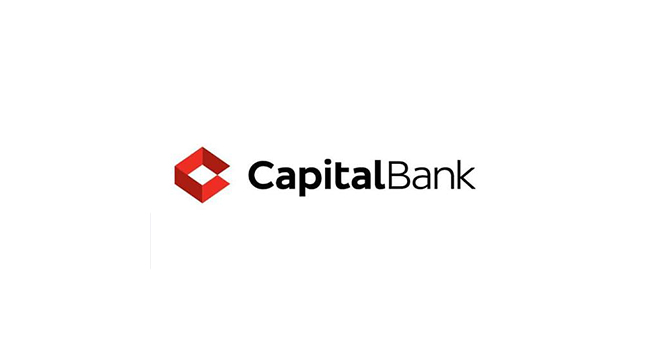
This report details the assets and liabilities of Capital Bank Limited as at 14 August 2017 when its licence was revoked by the Bank of Ghana.
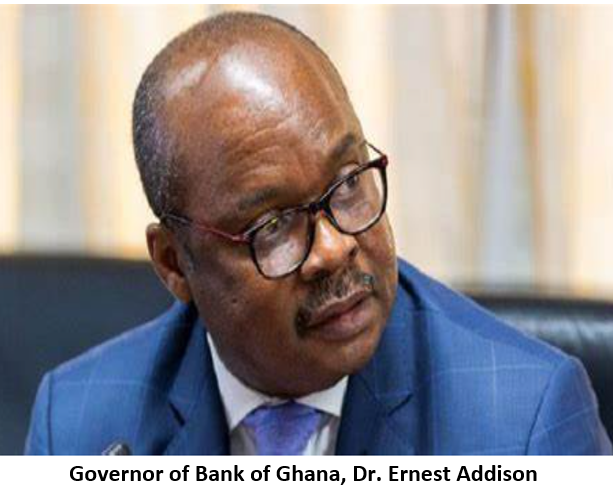
The Bank of Ghana has forwarded a number of suspected cases of financial crime to the Economic and Organised Crime Office (EOCO) for investigations. They include suspicious request to the Central Bank for payment of large sums of inward remittances that has been withheld by the regulator and requests by receivers for investigations into defunct Savings and Loans Companies and Microfinance institutions. In the first case, the Central Bank said following an emerging trend that it has observed over the last few years, it has since October 2020 submitted five separate requests to EOCO for investigations into claims of persons (individuals, businesses, and law firms acting on behalf of clients) who have persistently made claims on the BoG to the effect that certain large sums of money purportedly remitted to them by foreign counterparties through the banking system have been withheld by BoG. “These claimants often attached documentation alleged to be messaging from the SWIFT international funds transfer system, as proof of the receipt and retention of their funds by BoG”. It explained. “Following BoG’s preliminary investigations which have shown that these claims are fake, BoG has referred such matters to EOCO for further investigation. EOCO has made significant progress in these investigations and has initiated prosecution in some of these cases, while investigations in other cases continue”, it added. On the second case, the Bank of Ghana said, in its public notices in 2019 announcing the revocation licences of certain defunct Savings and Loans Companies, Finance Houses, and Microfinance Institutions, it cited a number of potentially criminal actions on the part of these institutions and their shareholders, directors or management, as the case may be. “Following further investigations into the failure of these institutions by the Receivers appointed by BoG, these cases were referred to EOCO for advice. EOCO has conducted independent investigations into a number of these cases as listed below and has made recommendations to the Attorney General’s Department for consideration and possible prosecution”, it pointed out. The firms include Ideal Finance, GN Savings and Loans, CDH Savings and Loans, Midland Savings and Loans, Legacy Capital Savings and Loans, FirsTrust Savings and Loans, Express Savings and Loans, IFS Savings and Loans, uniCredit Savings and Loans and Dream Finance Company. Others are Goldman Capital Microfinance, Dwadifo Adanfo Microfinance, CIG Microfinance, Adom Sika Microfinance, Nationwide Microfinance, Cypress Microfinance, Jorbies Microfinance, DPF Microfinance and FTS Capital Microfinance. The Central Bank further mentioned that “EOCO continues to work with the Attorney General’s Department towards speedy prosecutions of persons suspected to have been complicit in the failures of these institutions.” “In the meantime, EOCO has frozen and/or impounded some assets of such persons to help with reimbursements of the claimants of the defunct institutions”. It concluded, saying, the Central Bank will continue to deepen its collaboration with EOCO and other law enforcement Agencies in the country, to help promote financial integrity and trust and confidence in our banking system.
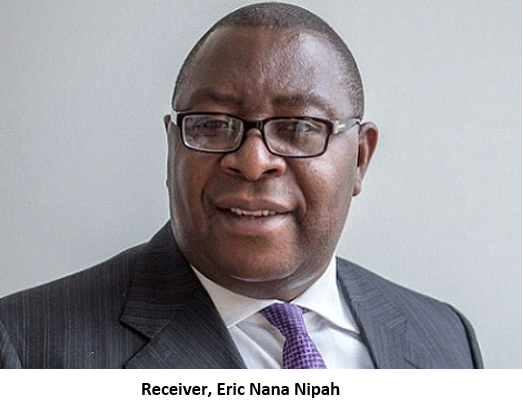
The Receiver for the collapsed 347 Microfinance Companies (“MFIs”) and the 23 Savings & Companies, Eric Nana Nipah, is in the process of selling another set of landed properties belonging to some of the defunct firms. Mr. Nipah had earlier in March 2021 announced the sale of some of the properties of the affected firms. At the moment, the Receiver is calling for bids from persons interested in acquiring any of the 24 advertised properties located in the Greater Accra, Central, Eastern and Bono East Regions. “Interested bidders who want to inspect the properties or have enquiries may visit the receivership website on http://www.ghreceiverships.com or contact the Receiver’s representative, Yvette Bourreau, on yvettebourreau@yahoo.com or 0559416841 to reserve an inspection appointment,” Mr. Nipah said in a statement. “Details of the condition for the sale of these properties are set out in a sales memorandum, which can be assessed on the website above,” the Receiver added. The Receiver in the statement added that all bids are to be submitted on or before 4pm on Friday, November 26, 2021. Interested bidders should submit their bids in a signed and dated formal letter to the following address: The ReceiverNo. 54 Olusegun Obasanjo High WayOpposite Accra Girls Senior High SchoolAccra Background Pursuant to Section 123 (1) of the Banks and Specialised Deposit-Taking Institutions Act, 2016 (Act 930), the Bank of Ghana on 31 May 2019 and 16 August 2019 revoked the operating licenses of 347 insolvent Microfinance Companies and 23 Savings & Loans and Finance House Companies respectively. Most of the affected firms according to the central bank were either insolvent or had folded up.
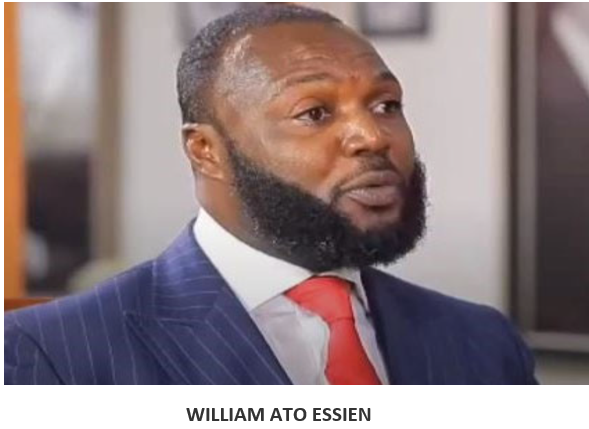
The Founder and Chief Executive Officer (CEO) of defunct Capital Bank, William Ato Essien, has renewed his plea to refund part of the monies he allegedly stole from the bank leading to its insolvency. His lawyers have once again written to the Office of the Attorney General to resume negotiations under Section 35 of the Court Act (Act 459, 1993) which allows an accused person who “admits the offence and is willing to offer compensation or make restitution and reparation for the loss, harm or damage caused.” This is the third time he has taken this step hoping to pay part of the monies as part of the effort to reduce the number of charges for which he is standing trial before an Accra High Court, together with two other persons who worked with him in the bank. Counsel’s Request Ato Essien was supposed to open his defence in the case yesterday, but appearing before the trial court, Baffour Gyau Bonsu Ashia who held the brief for Thaddeus Sory, counsel for Ato Essien, told the court that they have sent a letter to the prosecution to resume negotiation in making the refunds and have “received a response from the prosecution indicating their willingness to afford us the opportunity.” Counsel, therefore, prayed the court to give them the opportunity to resume their negotiations with the prosecution, suggesting that the court should give them about four weeks instead of the two weeks suggested by the prosecution. No Objection The prosecution led by Marina Appiah Opare, a Chief State Attorney, indicated that the prosecution received the request from Ato Essien to resume discussion and said the AG’s Department is not against any attempt to refund part of the money, and are willing to resume such a discussion. She, however, told the court that “the said discussion we hope should not take more than two weeks and therefore, if this court is minded to grant an adjournment, it should be two weeks.” Addo Attuah, counsel for Fitzgerald Odonkor, who is on trial alongside Ato Essien, on his part, told the court that although the issue at hand did not concern his client, he thinks the four weeks requested by counsel for Ato Essien is reasonable based on his personal experience with negotiations under Section 35 of the Courts Act. Court’s Ruling The court, presided over by Justice Eric Kyei Baffuor, a Court of Appeal judge sitting as an additional High Court judge, in his ruling, said he has considered the fact that Ato Essien was desirous of reaping the benefits of Section 35 of the Courts Act and has balanced it against the need not to needlessly delay the case in which he is supposed to open his defence. “Weighing these two competing interest and balancing same, I am of the view that not more than 20 days adjournment to enable the parties to conclude negotiations would be an apt time. If that is not achieved, no injustice at all would be occasioned the first accused if the trial were to resume while the parties attempt to conclude the negotiations.” He said the court will proceed with the trial on the next adjourned date even if the parties have not reached an agreement “in order not to breach the first accused person’s (Ato Essien’s) right to fair trial within a reasonable time as spelt out by the Constitution.” Justice Kyei Baffuor therefore adjourned the case to November 4, 2021, for continuation of the case. Meanwhile, the court has heard that Ato Essien was indisposed, which was why he was absent from yesterday’s court sitting. Main Trial Ato Essien alongside the defunct bank’s former Managing Director, Fitzgerald Odonkor, together with Tetteh Nettey, a former Managing Director of MC Management Service owned by Mr. Essien have been charged with 26 counts of conspiracy, stealing and money laundering. The three (3) are alleged to have misappropriated a total of GH¢620 million liquidity support given to the private bank by the Bank of Ghana (BoG), to enable it to service its maturing debts. The accused persons, according to the prosecution, opened various bank accounts with Capital Bank through which the GH¢620 million BoG liquidity support was transferred, while others were carried in jute bags, popularly known as ‘Ghana Must Go’, to Ato Essien. Another person, Kate Quartey-Papafio, CEO of Reroy Cables, who was facing three counts of conspiracy to steal, stealing and money laundering, was acquitted and discharged by the court for lack of evidence.

IN THE MATTER OF THE BANKS AND SPECIALISED DEPOSIT-TAKING INSTITUTIONS ACT, 2016 (ACT 930) IN THE MATTER OF THE RECEIVERSHIP OF PREMIUM BANK GHANA LIMITED (IN RECEIVERSHIP) AND HERITAGE BANK GHANA LIMITED (IN RECEIVERSHIP) NOTICE TO THE GENERAL PUBLIC SALE OF VEHICLES AND CHATTELS OF PREMIUM BANK GHANA LIMITED (IN RECEIVERSHIP) (“PREMIUM”) AND HERITAGE BANK LIMITED (IN RECEIVERSHIP) (“HERITAGE”) Pursuant to section 123 (1) and section 16(1) (a) (7) and (8) of the Banks and Specialised Deposit-Taking Institutions Act, 2016 (Act 930) (“the Act”), Bank of Ghana (“BoG”) on 4 January 2019 revoked the operating license of Premium and Heritage respectively and in accordance with Section 123(2) of the Act appointed Vish Ashiagbor, Director of PricewaterhouseCoopers Ghana Limited (“PwC”), as the Receiver for the purposes of winding down the affairs of Premium and Heritage. The Receiver wishes to inform the general public that he is requesting firm bids from potential buyers to acquire Premium and Heritage’s chattels located at Premium DR Warehouse, Plot LI 23A Tema Motorway Industrial Area, behind Sintex Polytank Industry, Spintex Road as well as the following vehicles located at former Head Office of Premium, No 5 2nd Ringway Estates, Osu-Accra: 2 Mitsubishi Pajeros (2016 Models) 1 Honda City (2017 Model) and 1 Toyota Hilux (2014 Model) Interested parties who want to inspect the chattels and motor vehicles or have enquires should kindly contact Naa Dzadzama Quao at PwC Tower, A4 Rangoon Lane, Cantonments, or call 0302761500. All bids are to be submitted on or before 4pm on Monday 19 July 2021. Interested bidders should submit their bids in a signed and dated formal letter to the following address: The Receiver Premium Bank (In Receivership) No 5 2nd Ringway Estates Osu, Accra The Receiver Heritage Bank (In Receivership) No 5 2nd Ringway Estates Osu, Accra Attention: Naa Dzadzama Quao SIGNED VISH ASHIAGBOR RECEIVER
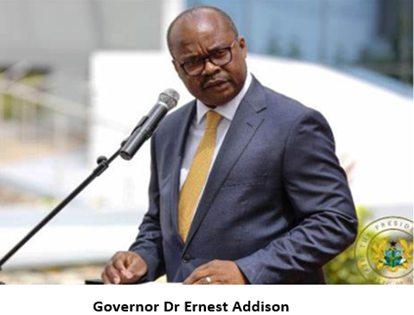
Governor of the Bank of Ghana, Dr. Ernest Addison, has provided a detail response to the reason the Central Bank will not be appearing before a Parliamentary Committee to answer a petition by some shareholders of defunct UT Bank and unibank. According to him, one of the major reasons is to allow the legal proceedings to flow smoothly, since some of the shareholders have already slowed the process with many counter suits. Speaking at the Ghana Chamber of Commerce and Industries Business Forum, Dr. Addison said “running to parliament to seek redress for the revocation of an institution’s licence is not one of the processes laid down under the law for those who feel aggrieved by a licence revocation by the Bank of Ghana. There are already a number of actions filed in court and at arbitration by the same persons who run to parliament for cover up and the Bank of Ghana simple response to parliament is respectfully to allow the pending legal processes to run their course.” “Indeed sometimes in September 2018, the 7th Parliament undertook a formal inquiry into the financial sector clean up, the key factors that led to it and the manner in which it was carried out. Among other things to appear before it and to answer specific questions aimed at assisting the committee to understand the events surrounding the cleanup exercise. The Bank of Ghana cooperated fully with the committee and provided all the necessary information to assist its members reach their own conclusions”, he further noted. Dr. Addison explained that the Central Bank had hoped the committee would have made available its report to Parliament and the public after deliberations, but nothing was heard. He called for public support for the receivers to be able to retrieve all properties of the defunct financial firms, as well as the government, to recover the over ¢19 billion bailout fund used to settle depositors funds. The Governor also used the opportunity to request the Finance Committee of Parliament to make public its investigative report on the banking sector clean up exercise, which was conducted in 2018. Timing of banking cleanup apt The Governor also used the opportunity to clarify assertions that the timing of banking cleanup was not the best, saying, “the timing of the clean-up and reforms could not have been better, and there is no doubt in the minds of any well-meaning Ghanaian, of the criticality of the reforms in the banking sector in anchoring the economic transformation and re-vitalization agenda of the government.” Covid-19 regulator reliefs The Governor also said the COVID-19 related regulatory reliefs and policy measures have continued to support lending activities in the banking sector. However, in response to the crisis, Dr. Addison said there was substantial paying down of debt incurred before the crisis by the private sector in tandem with rapid growth in issuance of new loans. From the beginning of the year to April 2021, new advances totalled ¢10.5 billion, marginally lower than the advances of ¢10.9 billion during the same period in 2020. Due to weakened demand conditions, and the substantial paydown of debt (about GH¢36.0 billion in 2020 and GH¢15.0 billion during the first five months of 2021), Dr. Addison said annual growth in private sector credit was 6.9 percent as at April 2021, compared with 17.9% recorded in April 2020. It is expected that as the economic activity rebounds and lending rates drop further, private sector credit will pick up. Businesses must take advantage of new norms Dr. Addison also urged businesses to take advantage of demographics, values and changes in technology, and identify new opportunities. “The opportunities from the extent of digital penetration in Ghana must be identified with high level of internet subscribers and wireless subscribers. Technological innovation can for example enhance agricultural productivity through the use of GIS information to undertake precision farming. Technology such as digitisation of medical records and remote diagnosis of diseases also has potential for the health services sector. Indeed, the impact of technology in promoting financial inclusion using digital technology is another example of how technology can help create new opportunities”, he added. President of the Ghana Chamber of Commerce and Industries, Clement Osei Amoako in a speech expressed confidence that members of the business community are ready to support government’s economic revitalization programme. The theme for the forum was “Redefining business success “the path for business value, resilience and sustainability.”
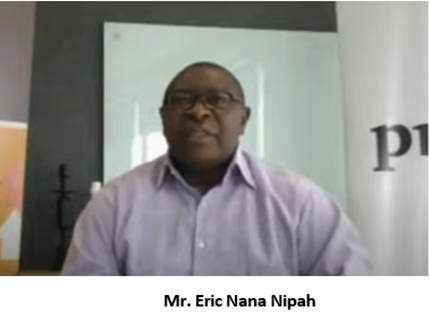
The Joint Receiver of the collapse Banks and Microfinance institutions has revealed that some customers are yet to receive their monies. According to Mr Eric Nipa, some customers sent in their claims late while others had no information to validate their claims because their institutions had already collapsed before the revocation of license. Hence, when the government released GH₵6.5billion, it was for the payment of depositors’ claims that had already been validated, he said. “When I was made, for example, receiver of the 347 microfinance institutions, there were 155 of this Microfinance which ceased to operate way before the revocation of their licenses, and so many of them do not have records, till this day we cannot locate those records.” “What typically happens in that situation is that within 90 days of the company being placed into receivership, you are supposed to have submitted your claims, based on which I would review, validate and approve these claims and then admit them,” the Director of PricewaterhouseCoopers (PwC) said. https://www.youtube.com/watch?v=6J5aErNPRBg&t=14s His comment comes after the Bank of Ghana revoked the class 1 banking licenses of nine banks, some microfinance institutions, and savings and loans companies during the financial sector clean-up. The move led to depositors’ funds being locked up. The Consolidated Bank Ghana (CBG) which is a merger of the collapsed banks was subsequently established. In 2020, the deputy Finance Minister said that more than 96% of depositors who had their monies locked-up from the banking sector clean-up “have been paid in full.” Charles Adu Boahen said 20% of the monies were paid in cash while 80% was paid in bonds. “The bonds were structured to pay out over four years,” he told MPs during the debate on the mid-year Budget Review in Parliament on July 28, 2020. But speaking on JoyNews, Mr. Nipa told Samson Lardy Anyenini, on Newsfile, that there is currently an excess of over GH₵1 billion that needs to be paid to depositors who submitted their claims after the deadline on July 4th 2020. He explained that he does not have the money to pay the depositors, however, he is putting together a report to the Bank of Ghana and the Ministry of Finance to consider supplementary payment. The PwC Director said that the payment of the funds, financed by the government, is part of the bailout scheme it set up to help clean the banking sector. Meanwhile, the Finance Minister Ken Ofori-Atta, in March 2020 revealed that the banking sector cleanup saved about 4.5 million customers of affected institutions from losing their deposits. He, however, revealed that a total of GH₵ 21billion was spent on the exercise. “We think we have done the best that the country deserves and the results show that we have a much stronger banking sector now than we had in 2017,” he said.
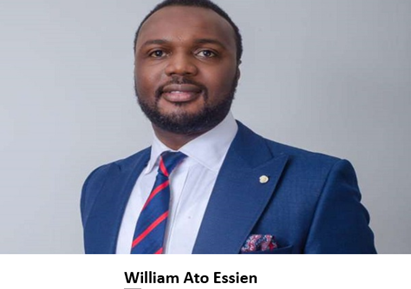
The Accra High Court will on July 8, this year, rule on a submission of “no case” filed by the Founder of the defunct Capital Bank, William Ato Essien, and three others accused of stealing depositors’ funds leading to the collapse of the bank. The other accused persons are the then Managing Director of the bank, Fitzgerald Odonkor, and Tettey Nettey, the Managing Director of MC Management Services, a company said to be owned by Essien, and Kate Quartey-Papafio, a businesswoman. After the prosecution brought its case to a close, lawyers for the accused persons indicated to the court that their clients would formally apply to the court to discharge them by filing a submission of no case in line with Section 173 of the Criminal and Other Offences (Procedure) Act, 1960 (Act 30). Extension of time When the case was called yesterday, it came up that only lawyers for Odonkor and Quartey-Papafio had filed their respective submissions of no case although the deadline set by the court which was May 25, this year. Counsel for Essien, Mr Baffour Gyawu Ashia Bonsu, informed the court that he had a little challenge so could only file his client’s submission of no case last Wednesday. For his part, counsel for Nettey, Mr Addo Atuah, pleaded with the court to give him an extension of time to file, arguing that there was a mix-up with the date. The presiding judge, Justice Eric Kyei Baffour, a Justice of the Court of Appeal sitting as a High Court judge, initially declined counsel’s request, but eventually agreed. “I graciously grant extension of time for counsel for the second accused to file the written submission of no case by June 15, 2021. The Republic is to file a response to all the submissions by June 18, 2021,” he ruled. Justice Kyei Baffour then fixed July 8 for the ruling of the submission of no case. Not guilty The four accused persons have pleaded not guilty to various counts of stealing, abetment to stealing, conspiracy to steal and money laundering. State prosecutors have accused them of engaging in various illegal acts that led to the dissipation of the GH¢620 million liquidity support given to Capital Bank by the Bank of Ghana (BoG) between June 2015 and November 2016. It is the case of the prosecution that Essien, with Odonkor’s aid, transferred the liquidity support to certain companies either controlled by him or in which he had interest. According to the prosecution, GH¢130 million of the liquidity support was transferred to MC Management Services, which was later presented to the BoG as the initial capital to set up Sovereign Bank, another bank in which Essien supposedly had an interest. The prosecution further alleged that between June and October 2015, Essien, aided by Odonkor, appropriated GH¢c27.5 million of the liquidity support by carrying it in jute bags. “The money was purportedly used as payment for business promotion,” the prosecution said. With regard to Quartey-Papafio, the prosecution said as part of the scheme to further dissipate the GH¢620 million liquidity support, Essien transferred GH¢70 million of the money into Quartey-Papafio’s bank account at Cal Bank. The prosecution accused Quartey-Papafio of trying to withdraw the money in 2017 even though she was aware that Capital Bank had collapsed and was in receivership. Revocation of licence Capital Bank was one of the first banks that collapsed after a massive clean-up of financial institutions by the Bank of Ghana started in 2017. On August 14, 2017, its licence and that of UT Bank were revoked by the BoG after it had declared them insolvent. The BoG allowed the state-owned bank, GCB Bank, to acquire the two banks in order to protect depositors’ funds and to also enable them to stay afloat. The hurricane that swept through the banking sector due to the collapse of the two banks further heightened in August 2018 when the central bank collapsed five other indigenous banks and merged them into one entity, known as Consolidated Bank Ghana.
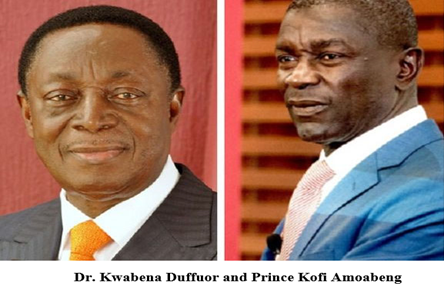
The Bank of Ghana (BoG) has insisted that it would not appear before a parliamentary committee probing into the circumstances surrounding the revocation of licences of uniBank Ghana Limited and UT Bank Limited, which became insolvent. The committee was set up by the Speaker of Parliament, Alban Bagbin, in late March, 2021, following petitions presented to Parliament by former Minister of Finance and founder of the defunct uniBank, Dr. Kwabena Duffuor, and his counterpart for the defunct UT Bank Limited, Prince Kofi Amoabeng, through NDC MP Mahama Ayariga. The central bank has written to the committee saying that Dr. Duffuor and Mr. Amoabeng are trying to use the back door to review the decision it took against them for breaching banking rules. The BoG wrote through their lawyers, Bentsi-Enchill Letsa and Ankomah, explaining that the petitioners, are seeking to procure the legislature to review decisions of the central bank, saying that the decisions were taken according to its statutory powers under the Banks and Specialised Deposit Taking Institutions Act, 2016 (Act 930). According to the central bank lawyers, the appropriate forum to seek redress has been spelt out in the law and did not understand why Dr. Duffuor and Mr. Amoabeng would not use those platforms to seek redress. Channels For Grievance “The BSDTI Act provides how persons who are aggrieved with such decisions may seek redress for their grievances, and the prescribed resolution mechanisms do not include recourse to Parliament,” the central bank stated. The central bank insisted that Dr. Duffuor and Mr. Amoabeng in petitioning the Speaker of Parliament are in essence asking the legislature to instruct the BoG in its constitutional mandate of promoting economic development and the efficient operation of a banking and credit system in the country. The central bank said what the petitioners are urging Parliament to do is contrary to section 3 (2) and section 4 (1A) of the Bank of Ghana Act, 2002 (Act 613). Heated Debate On March 30, 2021, Mr. Bagbin constituted a nine-member committee headed by First Deputy Speaker Joseph Osei-Wusu, aka Joe Wise, to consider the petitions presented to Parliament by Dr. Duffuor and Mr. Amoabeng. It was a revision of his earlier directive for the setting up of a seven-member committee to go into the petitions alleging disregard to the rules of administrative justice by the BoG and the Ghana Stock Exchange in revoking their banking licences. The two petitioners, whose insolvent financial institutions were taken over by the state as part of the banking sector clean up exercise in 2017, have been calling for investigation into the actions of the regulators. Ayariga Link Dr. Duffuor and Mr. Amoabeng on March 23, 2021, laid their separate petitions before the House through the NDC MP for Bawku Central, Mahama Ayariga, on the dictates of Order 76 (1) of the Standing Orders of Parliament. Mr. Bagbin then proceeded to propose the setting up of a seven-member committee to go into the petitions, ruling that his admission of the petitions did not contravene the rule on sub-judice. Committee Members He added that, in consultation with leadership, he composed the nine-member committee to be chaired by the MP for Bekwai and First Deputy Speaker, Joseph Osei-Wusu, with others, including Alexander Afenyo-Markin (Deputy Majority Leader and NPP MP for Effutu), Joe Ghartey (NPP MP for Essikado-Ketan), Patrick Yaw Boamah (NPP MP for Okaikoi Central), and Samuel Atta- Akyea (NPP MP for Abuakwa South). The rest are James Klutse Avedzi (NDC MP for Ketu North), Cassiel Ato Forson (NDC MP for Ajumako-Enyan-Esiam), Isaac Adongo (NDC MP for Bolgatanga Central) and Elizabeth Ofosu-Adjare (NDC MP for Techiman North). Majority Protest Prior to the admission of the petitions, some members of the Majority Caucus kicked against the parliamentary probe, citing the rule on sub-judice since the issues were subject matters before the courts. The Majority Leader, Osei Kyei-Mensah-Bonsu, in particular, had argued it was wrong for Parliament to consider the petitions and requested the Speaker to reconsider his ruling to admit the petitions. However, Mr. Bagbin, justifying his decision, ruled that the admission of the petitions did not contravene any law or provisions of the Standing Orders of Parliament, and that it was in accord to parliamentary practice. Main Petition Dr. Duffuor and Mr. Amoabeng wanted Parliament to investigate what they considered to be a disregard to the rules of administrative justice guaranteed under Article 23 of the 1992 Constitution and recommend that their banks should be given back to them. The calling for the probe is being done at the time their respective cases are undergoing both civil and criminal trials in court. Dr. Duffuor wants Parliament, in particular, to investigate the conduct of the central bank in respect of the takeover and appointment of an official administrator for uniBank Ghana Limited as well as the circumstances surrounding the revocation of the banking licence of the bank. Mr. Amoabeng, on the other hand, wants the legislative arm to investigate the conduct of the BoG and the GSE for the revocation of UT Bank’s licence and delisting the bank. According to Mr. Amoabeng, the revocation of UT Bank’s licence and the delisting of the bank from the stock exchange amounted to a conduct “without due regard to the rules of administrative justice guaranteed under Article 23 of the 1992 Constitution.” Amoabeng Interview Interestingly, Mr. Amoabeng is on record to have said that high levels of non-performing loans and thievery by some staff collapsed his bank. The central bank cited weak supervisory standards, breaches, operational weakness and persistent liquidity challenges in its cash reserve requirements as some of the reasons for the takeover, while management of UT Bank was accused of mishandling depositors’ cash by engaging in fictitious and unlawful activities.